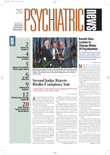Maryland Governor Parris Glendening vetoed a bill last month to the relief of the Maryland Psychiatric Society (MPS), the state medical society, and the suburban chapter of the Washington [D.C.] Psychiatric Society.
“We opposed the bill because patient care would have suffered if nurse practitioners replaced physicians as the patients’ primary provider,” MPS President Robin Weiss, M.D., told Psychiatric News.
MPS members called and wrote the governor’s office and their state legislators urging them to oppose the bill. Although the bill passed the state legislature by a narrow margin in April, the lobbying effort paid off when the governor vetoed it last month.
Glendening explained that he vetoed the bill because he was concerned about the lack of consensus among health care professionals on the role of the state’s estimated 1,600 nurse practitioners, according to a press release from his office.
The bill was supported by nurses generally and by the HMO industry.
Glendening was also concerned that the bill would result HMOs’ coercing n patients into using nurse practitioners, according to his press release.
“Nurse practitioners do not have the same training as physicians,” said Weiss. For example, they are required to complete only 57 credits of postgraduate training, according to MPS Assistant Executive Director Jennifer Gajewski.
The legislative goal stated in the bill’s preamble was to give patients in HMOs greater access to and choice in selecting health care providers. The bill would have allowed nurse practitioners to contract with HMOs as primary care providers.
The preamble also states that Maryland’s new Medicaid program has recognized nurse practitioners as primary care providers.
Weiss pointed out that the proposal “was simply a cost-cutting measure by the HMOs.”
Lawrence Kline, M.D., a psychiatrist in Bethesda, Md., and the Area 3 representative to the APA Assembly, told Psychiatric News, “This is clear-cut evidence of the economic basis of these ‘scope of practice’ invasions.”
The MPS defeated a bill in 1997 that would have allowed nurse psychotherapists with 37 credit hours of postgraduate training to prescribe medication independently of physicians (Psychiatric News, April 18, 1997).
Weiss clarified that the nurses’ prescribing bill wasn’t the equivalent of the kind of prescribing authority psychologists are trying to obtain in some states, because nurse practitioners are already allowed to prescribe medications with physician oversight under Maryland law.
Albert Blumberg, M.D., president of the Maryland State Medical Society, said in a press release, “Currently, nurse practitioners treat patients in collaboration with physicians. The medical society appreciates and supports nurses in that role. Furthermore, we look upon the veto of this bill as an opportunity for honest discussion about the appropriate roles of physicians and nurses in the health care system.” ▪
